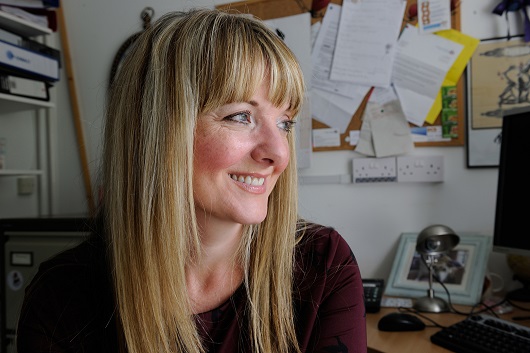Tapping into dementia

Communicating with individuals with advanced dementia in their own terms can have a profound effect on the lives of those living with the illness, according to a specialist in the subject.
Dr Maggie Ellis, of the University of St Andrews, says that working with an individual’s non-verbal ‘language’ can allow families to connect with loved ones in powerful new ways.
The researcher says the method is a simple but effective means that relatives and professional caregivers can use to retain or create an emotional bond with individuals with advanced dementia.
Alzheimer’s Scotland say the approach, which will be discussed at a special event in St Andrews tonight (Monday 10 November), ‘holds great promise’.
Dr Ellis, a dementia specialist, developed the method of ‘reaching’ individuals in advanced stages of dementia with fellow psychologist Professor Arlene Astell. The researchers found that people with advanced dementia respond more readily to reflections of their own communication behaviours than to speech.
Working closely with local nurses, individuals living with advanced dementia and their families, Dr Ellis and Professor Astell have witnessed first-hand the ‘transformative’ impact of the intervention they call ‘Adaptive Interaction’.
Dr Ellis says their discovery is an important insight as rates of dementia increase.
She said, “It really is a case of going back to basics. At first people find it strange or awkward to communicate with an adult using non-verbal communication such as hand movements or facial expressions. It requires time and effort, but the important thing is that it really does work.
“I’ve witnessed some really profound reactions to this type of communication. For some families, it’s the only way they have left to engage in meaningful interactions and retain a close connection to their loved one. They often describe the discovery that they are able to stay in contact as ‘an amazing feeling’.”
For professional caregivers, the approach provides them with the means to connect with individuals they care for in a way that may have been previously impossible.
The lecture is hosted by the organisation connected baby, recently founded by Dr Suzanne Zeedyk, an Honorary Fellow of the School of Psychology at the University of Dundee. Dr Zeedyk, who has trained 20,000 people in the science of connection in the last three years, said, “It is fantastic that this lecture will allow us to highlight how non-verbal capacities remain central to our ability to thrive as human beings, from the moment of birth and throughout our lifespan. It is too seldom that our understanding of dementia is framed from a developmental perspective.”
The lecture, which 200 people have signed up to attend, will also serve as the launch of a new book co-authored by Drs Ellis and Zeedyk and published by connected baby. Entitled ‘Rethinking Communication: The connected baby guide to advanced dementia’, the book is aimed at family members and professional carers of people affected by advanced dementia.
Henry Simmons, Chief Executive of Alzheimer’s Scotland, will speak at the sold-out launch event in St Andrews. He said, “Adaptive Interaction holds great promise. Yet the connected developmental theory that explains its effectiveness is in danger of being misunderstood. This book does a superb job of showing us how we can overcome this and truly honour each person’s humanity”.
The research has profound implications for the way individuals with advanced dementia are treated, not just by nursing staff, but their families who may feel their loved one is ‘gone’.
Those utilising the techniques developed by Dr Ellis and Professor Astell talk of seeing their loved ones ‘glow’ and laugh and engage in ways they hadn’t seen for a long time, and the comfort they feel from this connection. Tonight’s event will also feature those with real life experience who will speak about its effectiveness, and what they have learned about dementia through its use.
Dr Zeedyk added, “Cutting edge science is now showing us that many of the symptoms attributed to dementia can be traced back to emotional attachment patterns established in early in life. This link surprises people, but it makes perfect sense when you understand the science of connection.
“Those early experiences shape how the brain functions, and especially how it self-regulates stress. Dementia generates a great sense of stress. If we recognise that, then we can help carers to reduce that stress, rather than be confused by it.”
Following the lecture, the books will be available for the public to purchase, priced £5, through the connected baby website: www.connectedbaby.net.
The lecture ‘How dementia helps us to better understand our common humanity’ takes place in St Andrews tonight (Monday 10 November).
ENDS
NOTE TO EDITORS:
DR MAGGIE ELLIS IS AVILABLE FOR INTERVIEW ON: TEL 07980699361 or EMAIL [email protected]
DR SUZANNE ZEEDYK IS AVAILBLE FOR INTERVIEW ON: TEL: 07841 051316 or EMAL [email protected]
Adaptive Interaction
Adaptive Interaction is based on an approach used by those coping with communicative impairment caused by a stroke, learning disability or severe autism, known as Intensive Interaction. This technique is based on developmental theory that traces how all human beings learn to talk by building on the non-verbal communicative abilities with which they were born.
About connected baby
The aim of the organisation is to make the scientific discoveries that are now emerging about the importance of relationships accessible to the public. Numerous scientific studies now highlight emotional connection as central to human health and well-being, at a physiological as well as psychological level. The economic implications for a society have been shown to be massive.
The research carried out was made possible thanks to the award of a £5000 Scottish Funding Council Innovation Voucher.
NOTE TO PICTURE EDITORS:
IMAGES OF DR ELLIS AT WORK ARE AVAILABLE FROM THE PRESS OFFICE – CONTACTS BELOW.
Issued by the Press Office, University of St Andrews
Contact Gayle Cook, Senior Communications Manager on 01334 467227 or email [email protected]
Ref: Tapping into dementia 071114
Category Research